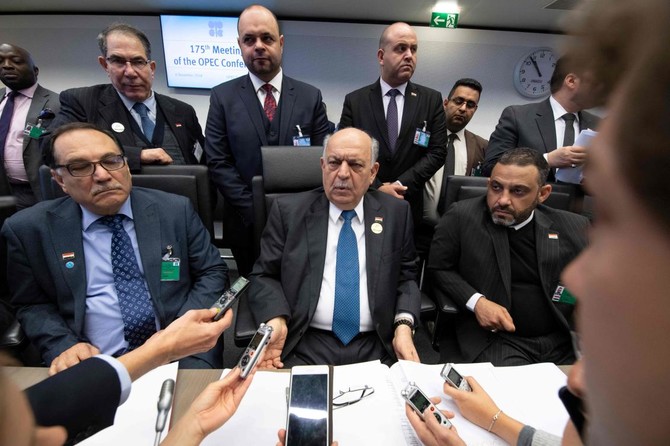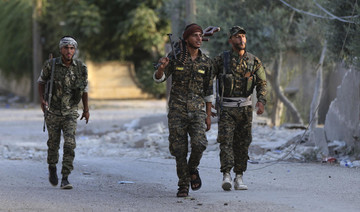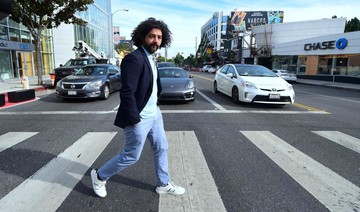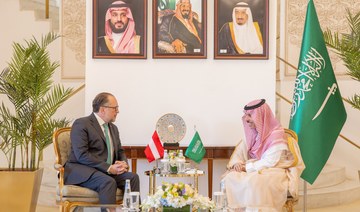BAGHDAD: Iraqi Oil Minister Thamer Ghadhban said on Monday he expected the fall in oil prices to stop and for prices to rise over time, adding that if OPEC had not cut production, prices would have dropped to $45-50 per barrel.
Speaking at a ministry event in Baghdad, Ghadhban said the recent fall in Iraqi exports was not due to technical reasons, as Iraqi oil fields have high capacity, but rather because of weather conditions.
“Our goal is to reach an export capacity of 6.5 million barrels per day but over several stages,” he said.
Speaking about the recent Kirkuk oil deal with the semi-autonomous Kurdistan Regional Government (KRG), Ghadhban said state oil marketer SOMO had received preferential prices, albeit for low quantities.
Iraq last month restarted exports of Kirkuk oil, halted a year ago due to a standoff between the central government and the KRG, after a new government in Baghdad agreed a tentative deal with Irbil.
Iraqi oil minister expects prices to rise over time
Iraqi oil minister expects prices to rise over time

- Ghadhban said the recent fall in Iraqi exports was due to weather conditions
- “Our goal is to reach an export capacity of 6.5 million barrels per day but over several stages,” he said
South Korea, UAE sign deal to slash import duties at leaders’ summit

SEOUL: South Korea and the UAE signed a trade pact on Wednesday to sharply cut import duties at a summit of their leaders that pledged closer business and investment ties.
Host South Korea welcomed the UAE’s President Sheikh Mohammed bin Zayed Al-Nahyan with a traditional honour guard and a flypast of air force jets.
“The special bond between the two leaders serves as an opportunity to deepen and advance the two countries’ special strategic partnership,” the office of President Yoon Suk Yeol said in a statement.
The summit, which follows Yoon’s state visit last year to Abu Dhabi, focused on energy and defense, as South Korea seeks to tap the investment potential of the energy-rich Gulf state.
In its statement, Yoon’s office said the UAE reaffirmed last year’s pledge of $30 billion in investment for South Korean businesses, in areas from nuclear power and defense to hydrogen and solar energy.
The two sides also signed an agreement to boost investment flows into future-focused sectors in South Korea’s economy, it added.
The Abu Dhabi National Oil Co. signed a letter of intent for a South Korean company to build at least six LNG carriers valued at about $1.5 billion, it said.
The industry ministers formally signed a Comprehensive Economic Partnership Agreement agreed in October that will remove all tariffs on South Korean arms exports when it is ratified, South Korea said.
The UAE will also drop import duty on automobiles over the next decade, during which South Korea’s tariffs on crude oil imports are to be removed.
The deal will eventually scrap tariffs on more than 90 percent of the imports of both.
On Tuesday, Sheikh Mohammed met the leaders of some of South Korea’s top conglomerates including Jay Y. Lee of Samsung Electronics, SK Group Chairman Chey Tae-won and Kim Dong-kwan of Hanwha Group, which has emerged as a major defense contractor.
No new arms deal was unveiled, but Yoon’s office said both aim to boost long-term cooperation of their defense industries.
South Korea has signed a series of global defense equipment contracts as part of its plans to become the world’s fourth-largest defense exporter by 2027.
One such recent deal involves Poland, which seeks to bolster its defense as a close neighbor of Ukraine, which is at war with Russia.
Saudi, Dutch officials hold talks on logistics at Port of Rotterdam

- Discussions touched on encouraging Dutch infrastructure investments for metal processing in the Kingdom
RIYADH: The Kingdom’s Industry and Mineral Resources Minister Bandar Ibrahim AlKhorayef has held talks with officials at the Dutch Port of Rotterdam on ways to enhance cooperation in logistics, the Saudi Press Agency reported on Wednesday.
They discussed the role of the Kingdom, as a supplier of vital minerals, in the global supply chain, and investment cooperation with Dutch companies in metal processing and recycling.
AlKhorayef reviewed the objectives of the National Industrial Development and Logistics Program, under Saudi Vision 2030, which focuses on developing this sector of the Kingdom’s economy.
The minister also toured the port’s FutureLand area where he was briefed on the services provided to shipping companies which includes towing, docking, repairs, building and supply.
Saudi Arabia and Austria sign MoU for economic cooperation

VIENNA: Saudi Arabia’s economy ministry and its Austrian counterpart signed a memorandum of understanding to boost economic cooperation between the two nations.
The Saudi Ministry of Economy and Planning Austria’s Ministry of Labor and Economy in the deal on the sidelines of the Saudi-Austrian Joint Committee held in the Austrian capital.
The MoU was signed by the Saudi Minister of Economy and Planning Faisal bin Fadel Al-Ibrahim, and the Austrian Minister of Labor and Economy, Martin Kocher.
The MoU aims to diversify and strengthen economic ties, exchange experiences and information, and encourage cooperation in a number of fields, including trade, industry, research and development, tourism, small and medium enterprises.
Among the content of the MoU is the organization of conferences, seminars and the exchange of visits between experts, in addition to cooperation between government institutions and the private sector.
The parties are also committed to protecting intellectual property rights and exchanging information for the purposes specified in the MoU.
This MoU comes within the framework of a cooperation agreement in the economic, commercial, industrial and technical fields signed between the two governments in 2004.
Xi calls for more jobs for youth, migrant workers

- (We should) insist that employment of young people including college graduates is a top priority: Chinese president
BEIJING: China’s President Xi Jinping called on Monday for efforts to promote high-quality and sufficient jobs for college graduates and migrant workers, while presiding over a Politburo group study session, state media Xinhua reported on Tuesday.
“(We should) insist that employment of young people including college graduates is a top priority,” the Xinhua report quoted Xi as saying at a group study session of the Politburo, a top decision-making body of the ruling Communist Party.
The Xinhua report did not give details on job promotion support measures or plans.
The survey-based jobless rate for 16-24 year-olds, excluding college students, was 14.7 percent in April, down from 15.3 percent in March, official data showed last week.
China’s statistics bureau revised its methodology by removing college students from the survey pool after youth jobless rate surged to around 20 percent last year.
Xi also said the government should take steps to promote the employment of migrant workers, guide them to return to their hometowns and for people to start businesses in the countryside.
He called for stabilizing the income of people who had been lifted out of poverty and preventing large-scale return to poverty due to unemployment, Xinhua said.
Companies and industries with strong job creation capabilities will be supported, the report said.
China created 4.36 million new urban jobs in the first four months, Human Resources Ministry data showed, 36 percent of its annual job creation target.
Saudis spent more money on electronic devices during the 4th week of May: SAMA data

RIYADH: Saudi Arabia’s point-of-sale spending reached SR11.2 billion ($2.98 billion) in the fourth week of May, official figures showed.
The latest data from the Saudi Central Bank, also known as SAMA, revealed that spending on electronic and electric devices surged by 9.5 percent to reach SR240.4 million.
Beverages and food, which accounts for the largest share at 14.9 percent, saw a 5.9 percent decline, reaching SR1.66 billion, during the week from May 19 to 25.
Meanwhile, transactions at restaurants and cafes, holding a 14.6 percent share, recorded a slower decline of 4.8 percent, amounting to SR1.64 billion.
Saudi spending on miscellaneous goods and services, including personal care items, supplies, maintenance, and cleaning, constituted the third-highest share and witnessed a 5.1 percent decline that week, reaching SR1.36 billion.
Despite composing only 1 percent of the week’s overall POS value, spending on education recorded a minimal increase of 0.1 percent to SR152.48 million.
In the past few years, this sector has been allocated the largest share of government expenditure in comparison to other divisions of the economy.
Efforts are underway to revamp the education system, aiming to equip the national workforce with the necessary skills to thrive in a technological and information-centric global economy.
The hotel sector experienced the largest decline in POS transaction value, dropping 10.9 percent to SR227.13 million.
According to data from SAMA, 35.44 percent of POS spending occurred in Riyadh, with the total transaction value reaching SR3.97 billion. However, this represents a 1.6 percent decrease from the previous week.
Riyadh has undergone considerable expansion, evolving into a pivotal center for growth and progress. The city is witnessing a surge in new businesses setting up operations, drawn by its vibrant economic landscape and strategic prospects for investment and innovation.
Spending in Jeddah followed closely, accounting for 14.3 percent of the total and reaching SR1.60 billion; however, it marked a 3.1 percent weekly drop.
The two cities that registered the highest declines in POS spending were Makkah and Madinah, with decreases of 11 percent and 6.8 percent, respectively. The value of transactions in Makkah reached SR380.98 million, while in Madinah, it was SR393.26 million.


















